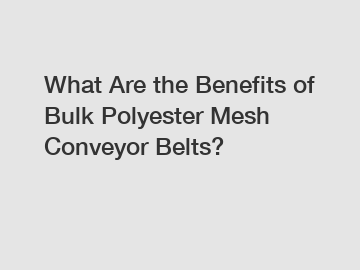What is specialty conveyor belts?
Jul. 22, 2024
In the realm of material handling, conveyor belts have become indispensable tools, efficiently transporting goods and products across various industries. However, not all conveyor belts are created equal. Specialty conveyor belts, designed to address unique conveying challenges, offer tailored solutions for specific applications. But what exactly are specialty conveyor belts, and what makes them so versatile? Let's delve into the world of these specialized conveyors and explore their diverse applications.
### What are Specialty Conveyor Belts?
Specialty conveyor belts are distinct from standard conveyor belts in their ability to handle complex materials, navigate intricate layouts, and meet specific performance requirements. These belts are often customized with unique features, such as raised flights, specialized surface coatings, or intricate belt designs, to meet the demands of specific applications.
### Unveiling the Benefits of Specialty Conveyor Belts
The allure of specialty conveyor belts lies in their ability to overcome the limitations of standard conveyor belts and address unique conveying challenges. Let's explore some of the key benefits attributed to these specialized conveyors:
Enhanced Material Handling: Specialty conveyor belts can handle a wide range of materials, including delicate products, abrasive substances, and irregular shapes, with minimal damage or spillage.
Adaptability to Complex Layouts: These belts can be configured to navigate intricate layouts, including inclines, declines, tight turns, and multi-level conveying systems.
Improved Product Flow and Efficiency: Specialty conveyor belts can optimize product flow, reduce bottlenecks, and enhance overall conveying efficiency.
Reduced Product Damage: Their specialized features minimize product damage, ensuring the integrity and quality of the conveyed goods.
Compliance with Industry Standards: Specialty conveyor belts can be designed to meet stringent industry standards, such as food safety regulations or hazardous material handling requirements.
Featured content:
Production Process and Precautions of Butyl Rubber Stoppers
Exploring the Diversity of Rubber Stoppers in Pharmaceuticals
What is Single-Phase Immersed Dielectric Coolant?
How to Apply High Tack Self Adhesive Vinyl
10 Questions You Should Know about Slurry Pump Selection
The Advantages of Implementing Copper Electrical Connectors for High-Voltage Systems
2024 Guide to Stainless Steel Corrugated Expansion Joint for Water Treatment System
### Applications of Specialty Conveyor Belts
The versatility of specialty conveyor belts has led to their incorporation into a wide range of industries, including:
Food Processing: Specialty conveyor belts are used in food processing plants to convey delicate fruits, vegetables, and packaged goods, ensuring product integrity and hygiene.
Pharmaceutical Industry: These belts play a crucial role in pharmaceutical manufacturing, transporting sensitive ingredients, components, and finished products.
Packaging and Assembly Lines: Specialty conveyor belts streamline packaging and assembly processes, efficiently moving products between workstations.
Electronics Manufacturing: In electronics manufacturing, these belts handle delicate components and circuit boards, preventing damage and ensuring product quality.
Bulk Material Handling: Specialty conveyor belts are used in industries like mining and quarrying to transport heavy, abrasive materials.
### Conclusion
Specialty conveyor belts have emerged as indispensable tools in various industries, offering tailored solutions for complex conveying challenges. Their ability to handle diverse materials, navigate intricate layouts, and meet specific performance requirements makes them invaluable assets in ensuring efficient and effective material handling operations. As technology advances and conveying needs become more sophisticated, specialty conveyor belts are poised to play an even more prominent role in shaping the future of material handling.
Key Questions to Ask When Choosing the Best Four Steel Wire Spiral Hose for Hydraulic R12
Top 5 Benefits of Silane Coupling Agents in Industrial Applications
Top 5 Uses for Fabric-Braided Hose in 2024
Ultimate Guide to 1250CFM Polyester Mesh Cloth
HVAC Hoses & Fittings: Ultimate Guide to Choosing & Installing
What Are Polyurethane Quarries Panels and Their Benefits?
What Are Dredge Suction Hose Benefits?
176
0
0
Related Articles
-
60
0
0
-
36
0
0
-
HDPE Sanitary Sewer Pipe: Benefits, Installation Tips, and Key Considerations
# HDPE Sanitary Sewer Pipe: Benefits, Installation Tips, and Key Considerations.
51
0
0
-
56
0
0
-
75
0
0
-
62
0
0
-
How Can Wire Braided Hoses Enhance Steam Efficiency and Safety?
## How Can Wire Braided Hoses Enhance Steam Efficiency and Safety?
64
0
0
-
What are the benefits of flat polyester mesh cloth?
Durability and StrengthFlat polyester mesh cloth is renowned for its exceptional durability.
50
0
0










Comments
All Comments (0)